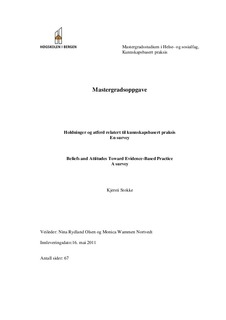| dc.contributor.author | Stokke, Kjersti | |
| dc.date.accessioned | 2018-02-01T15:09:23Z | |
| dc.date.available | 2018-02-01T15:09:23Z | |
| dc.date.issued | 2011-05-16 | |
| dc.identifier.uri | http://hdl.handle.net/11250/2481875 | |
| dc.description | Mastergrad i Kunnskapsbasert praksis | en_US |
| dc.description.abstract | Bakgrunn: Ved Radiumhospitalet integreres kunnskapsbasert praksis (KBP) gjennom prosjektet: ”Å implementere KBP i sykepleietjenesten ved Radiumhospitalet”. Halvveis i prosjektet var det behov for å kartlegge hvordan sykepleierne forholdt seg til KBP. Hensikt: Hensikten med studien var å kartlegge selvrapporterte holdninger og atferd til KBP hos sykepleierne ved Radiumhospitalet og se om det var en sammenheng mellom holdninger og atferd knyttet til KBP. Metode: Vi utførte en tverrsnittsundersøkelse blant 356 sykepleiere ved Radiumhospitalet. I tillegg til bakgrunnsvariablene alder, ansiennitet, kjønn, stilling, utdanning, kunnskap om KBP og deltagelse i KBP- arbeidsgrupper ble holdninger og atferd relatert til KBP registrert. Den norske versjonen av ”EBP Implementation Scale” og ”EBP Belief Scale” ble benyttet. Resultater: I undersøkelsen deltok 185 sykepleiere (svarprosent 52 %). Resultatene viste at sykepleierne hadde en positiv holdning til KBP, men de rapporterte liten grad av KBP-aktiviteter. Det var en sammenheng mellom holdninger og atferd relatert til KBP, der holdninger relatert til kunnskaper var av størst betydning for implementering. Sykepleierne hadde høy tro på verdien av KBP, men liten tro på egen kunnskap til KBP. Troen på KBP var signifikant høyere i gruppen som hadde lært om KBP i forhold til gruppen som ikke hadde lært om KBP, og i gruppen som arbeidet i kunnskapsbaserte arbeidsgrupper enn de som ikke gjorde det. Konklusjon: Studien indikerer at den enkeltes holdning til KBP er relatert til i hvilken grad de utfører KBP. Dette funnet er viktig siden kognitive holdninger er mottagelig til å endres ved intervensjoner. Å inneha kunnskaper og å arbeide i kunnskapsbaserte arbeidsgrupper ser også ut til å ha betydning. Å trene definerte personer i KBP, organisere og veilede arbeidsgrupper ser ut til å kunne være gunstig. | en_US |
| dc.description.abstract | Background: At the Norwegian Radium Hospital evidence-based practice (EBP) has been integrated through the project: “Implementing EBP in the nursing service at the Norwegian Radium Hospital”. Halfway through the project schedule we wanted to identify how nurses related to EBP. Aim: The purpose of this study was to investigate self-reported attitudes toward and implementation of EBP by nurses at the Norwegian Radium Hospital and see if there was correlation between beliefs and implementation to EBP. Method: A cross-sectional study among 356 nurses at the Norwegian Radium Hospital was performed. Background variables such as age, seniority, gender, occupation, education, knowledge of EBP and participation in EBP-working groups and attitudes and behaviors related to EBP were registered. The Norwegian version of the "EBP Implementation Scale" and "EBP Belief Scale" was used. Results: A total of 185 nurses participated in the survey (response rate 52 %). Results showed that the nurses had a positive attitude to EBP but they reported a low level of EBP – activities. A correlation between attitudes and behavior related to EPB showed that an attitude related to knowledge was of primary importance for the implementation. The nurses had a high belief in the value of EBP but little faith in their own knowledge of EBP. Belief in EBP was significantly higher in the group who had knowledge about EBP compared with the group who had no knowledge of EBP and in the group who worked in EBP- working groups compared with those who did not. Conclusion: The study indicates that an individual’s belief about EBP is related to the extent to which they perform EBP. This finding is important as cognitive beliefs about and implementation of EBP can be strengthened through interventions. To possess knowledge and to work in EBP working groups also seems to matter. Training defined persons in EBP, organizing and guiding the work groups appear to be beneficial. | en_US |
| dc.language.iso | nob | en_US |
| dc.publisher | Bergen University College | en_US |
| dc.subject.other | kunnskapsbasert praksis | en_US |
| dc.subject.other | KBP-implementeringsskala | en_US |
| dc.subject.other | KBP-holdningsskala | en_US |
| dc.subject.other | survey | en_US |
| dc.subject.other | sykepleiere | en_US |
| dc.subject.other | evidence-based practice | en_US |
| dc.subject.other | EBP implementation scale | en_US |
| dc.subject.other | EBP belief scale | en_US |
| dc.subject.other | nurses | en_US |
| dc.title | Holdninger og atferd relatert til kunnskapsbasert praksis. En survey | en_US |
| dc.type | Master thesis | en_US |
